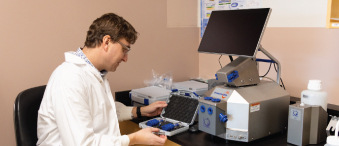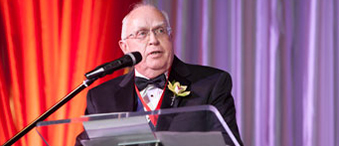Originally published: September, 2020
Updated: July, 2022
“Leaner and meaner than ever”
When Fran hit the 18-month mark of his recovery, his care team didn’t want him to get his hopes up. Typically, once patients with Guillain Barré Syndrome (GBS) reach that point, they don’t see much more improvement, but five years later, Fran is still making strides. “I was able to stand up on skates this past winter and started skating for the first time since my diagnosis. Then just a month ago, I regained feeling in my feet. It was a feeling that I haven’t experienced since I got GBS,” explains Fran.
He’s even back to long-distance cycling and is feeling stronger each day. “I’m leaner and meaner than ever,” says Fran with that infectious smile.
Read Fran’s original story below and learn why he’s so grateful for the care he received at The Ottawa Hospital.
Long-distance cyclist Fran Cosper described himself as being in the best shape of his life as he headed into the winter of 2017. However, in mid-February he woke up in the middle of the night unable to feel his legs. The next morning, when Fran tried getting out of bed, he slammed onto the floor – his strong legs suddenly useless. Soon after, he was diagnosed with Guillain Barré Syndrome (GBS) – facing the possibility of permanent paralysis. Little did he know the road ahead would involve a team of experts, the help of 3D virtual reality at The Ottawa Hospital, and a determination not only to walk again, but also to help other patients.
When Fran first experienced those sudden symptoms, he initially thought it couldn’t be anything serious as he was very health conscious. He attempted to make his way to the basement that morning to work out. “I went to get on my hands and knees, and fell face-first on the carpet. I thought, ‘Well, I can’t move. This is much more serious.’ My wife, Elise, came down and saw that I had facial paralysis, and thought I’d had a stroke.”
But Fran knew that strokes typically affect only one side of the body and that something else — something serious — was happening.
What is Guillain Barré Syndrome?
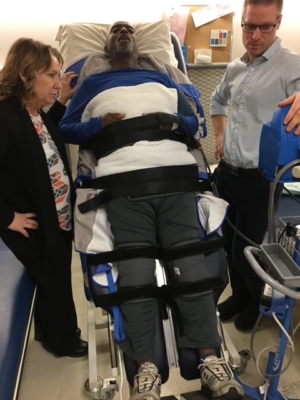
After a thorough assessment, Fran was diagnosed with GBS. This rare autoimmune disorder causes the immune system to attack the nerves, damaging the myelin sheath, which is the nerves’ protective covering. As a result, the brain can’t transmit signals to the nerves in the muscles, causing weakness, numbness or, as in Fran’s case, paralysis.
An infection or virus can bring on GBS. The 56-year-old had had two colds back-to-back, which may have thrown his immune system into overdrive. Within days, his balance was off, and he had difficulty lifting pots to cook dinner. Hours later, the disease was full blown, attacking his nervous system and Fran couldn’t move.
“It was like having an out-of-body experience. I mean my brain was working fine but my body wasn’t doing what I asked it to do.”
– Fran Cosper
“We see patients with Guillain Barré Syndrome at The Ottawa Hospital Rehabilitation Centre probably five or six times a year,” says Dr. Vidya Sreenivasan, a doctor of physical medicine and rehabilitation. Some have mild cases, but others, like Fran’s, are more serious.
A more challenging road to recovery
About one in 100,000 Canadians contracts GBS every year. Recovery can take more than a year because the nerves re-grow slowly, one millimetre per month. For Fran, the journey would be much longer.
The disease continued its nerve damage following his admission to the hospital. After two weeks, he transferred to the Rehab Centre, where his care team included doctors, psychologists, social workers, recreation therapists, physiotherapists, respirologists, occupational therapists, and nurses.
“I decided at that point, I was going to fight it. I was going to fight back and do the best I could to get better even though I didn’t know what the outcome was going to be.”
– Fran Cosper
Fran was completely dependent on this team for all of his care. He needed to be washed, dressed, and turned in bed. He couldn’t even close his eyes. The nurses had to tape his eyelids shut so he could sleep.
“It was like having an out-of-body experience. I mean my brain was working fine but my body wasn’t doing what I asked it to do,” says Fran. He also faced excruciating pain because of the damage done to his nerves. As Fran lay there unable to move in his hospital bed, he made a decision.
“Oddly, I wasn’t afraid. I decided at that point, I was going to fight it. I was going to fight back and do the best I could to get better even though I didn’t know what the outcome was going to be.”
Rehab team ready with state-of-the art technology
Fran’s excellent fitness level, as well as his determination and positive attitude, helped him through when it came to the rigorous therapy plan. He had physiotherapy five hours a day, including three times a week in the Rehab Centre pool. Within two months, he could stand and take steps with help. He learned to walk again thanks in part to our Virtual Reality lab – one of only two in Canada.
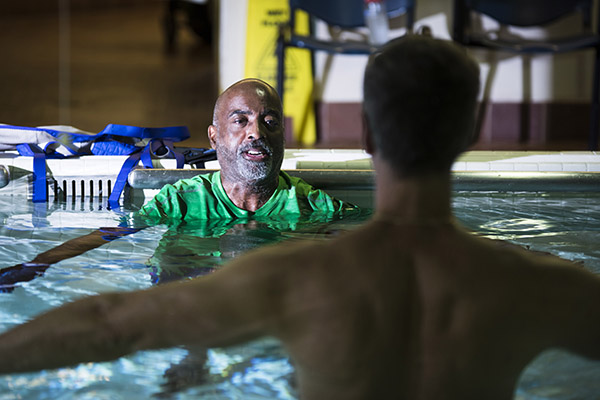
“The pool and this 3D room were invaluable. It would have taken me a lot longer to get my legs back if I didn’t have access to those tools.” – Fran Cosper
The CAREN (Computer-Assisted Rehabilitation Environment) system combines room-sized 3D graphics, a platform that moves with the patient in a harness, as they explore the 3D world, a dual-tread remote-controlled treadmill, and world-class motion analysis technology. Preprogrammed visual presentations allow the patient to respond to an environmental stimulus by shifting weight, increasing or decreasing speed and even making specific motions. Difficulty levels can be increased gradually as the patient progresses further in their rehabilitation treatment plans.
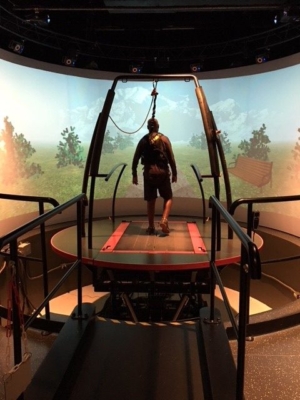
“This room is right out of sci-fi. It really challenges your body. After an hour of doing exercises, I was just sweating. The pool and this 3D room were invaluable. It would have taken me a lot longer to get my legs back if I didn’t have access to those tools.”
“I’d basically been swiped off the planet for a year. But the only negative thing about being in the hospital was the disease itself.” – Fran Cosper
For Dr. Nancy Dudek, Medical Director, Amputee Program at The Ottawa Hospital Rehabilitation Centre, this unique system offers many benefits to patients. “There’s no end to things you can do with that sort of creativity. To be able to be hooked up to a harness without the support of the parallel bars still gives you the safety aspect. It’s a very innovative and beneficial system.”
Installed in 2010 in partnership with the Canadian Forces and with support from the community, the CAREN system was initially used in part to help injured soldiers returning from Afghanistan. Since then, many patients have benefitted, including those who have had a traumatic brain injury, stroke, neuromuscular disease, amputation, or chronic pain.
Continuing the road to recovery
Released from the Rehab Centre in October 2017, tears were shed by Fran and nurses who cared for him. It was those nurses who helped Fran with day-to-day care, teaching him how to wash and dress himself and be independent again.
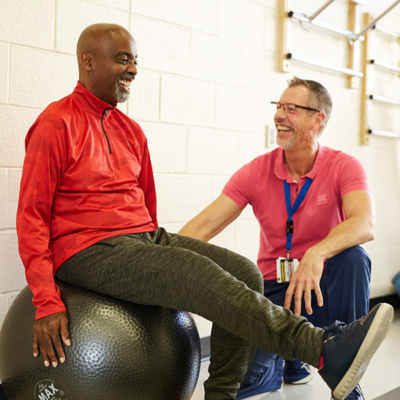
“I can honestly say that the kindness and level of care I got really humbled me. The nurses and staff have just been marvellous,” says Fran. “I’d basically been swiped off the planet for a year. But the only negative thing about being in the hospital was the disease itself.”
He walked out of the Rehab Centre using a walker. When he returned a month later for a follow-up appointment, he walked in on his own.
Today, Fran is back riding his bike – not quite to the 100-kilometer distances, yet, but his therapy continues. He still deals with pain, and his arms were slower to recover. His fine motor skills in his fingers are taking longer to get back to normal. As a saxophone player, he’s motivated to get his fingers working again.
“I’m kind of at the point now where I’m thinking I may be able to play again someday. I’m hopeful that I’ll be able to play my sax because my fine dexterity is improving – it’s a work in progress.”
Giving back as a volunteer
Fran will never forget two volunteers in particular who were there for him when he was being cared for at the Rehab Centre. Chris and Claude would come and take Fran for coffee and to talk. Initially, he had no idea who these blue-vested people were, but Fran quickly learned the important role they play at the hospital.
“I remember asking Chris why he was a volunteer. Chris explained to me that he had an inoperable brain tumour, and he was going to die. He told me, ‘I figured the hospital took such good care of me that I would spend the rest of my time volunteering.’ I broke into tears and decided right there I had to become a volunteer,” says Fran.
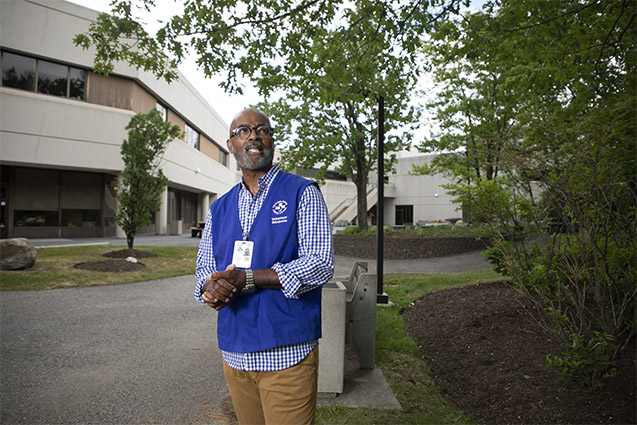
Pre-COVID, Fran would spend two days a week meeting patients, sometimes visiting his old room at the Rehab Centre, inspiring them about what is possible. “I remember seeing a woman in a hallway; she was on a gurney and going in for surgery – she was by herself. I stopped, leaned over, and told her it was going to be ok. Afterwards, I saw her again and she said, ‘Thank you.’”
That’s why Fran proudly wears the blue vest. He’s experienced the dark days and today, he’s happy to be able to help others when they need a reassuring voice to help them through – just like Chris and Claude helped him. He’s also grateful to be able to volunteer his time at the hospital that cared for him during his long journey to recovery.
Listen to Fran Cosper in his own words during a guest appearance on Pulse: The Ottawa Hospital Foundation Podcast.
The Ottawa Hospital is a leading academic health, research, and learning hospital proudly affiliated with the University of Ottawa.


